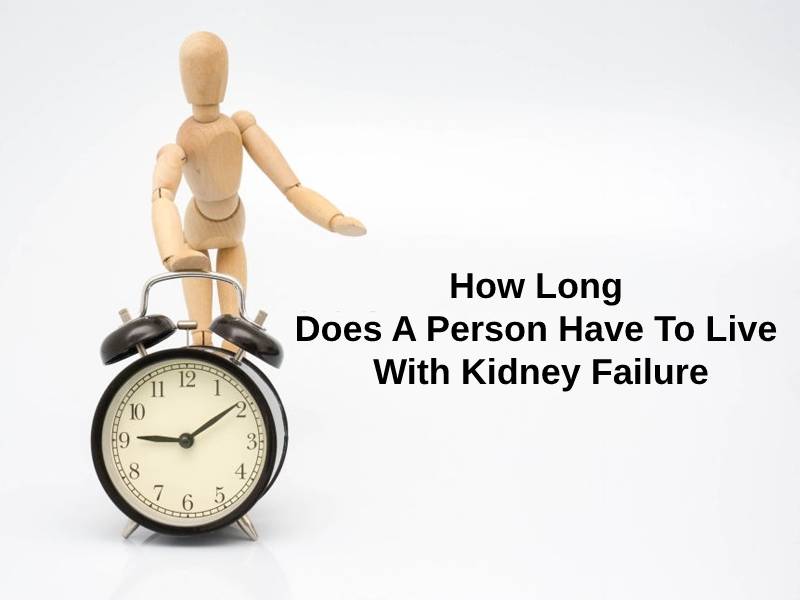Exact Answer: Few days only
In medical terms, failure of kidney function is known as renal failure. It is a complicated process that develops over a period of months to years. Sometimes, however, renal failure can occur over the span of a few days. Renal failure starts when a person gets chronic kidney disease or CKD, where the kidneys are unable to filter the blood of toxic waste products, which then start building up in the bloodstream. It becomes more and more severe in stages, with Stage 1 indicating some degree of damage to kidneys, while Stage 5 indicates complete kidney failure.

How Long Does A Person Have To Live With Kidney Failure?
| Treatment | Kind of lifespan |
| With proper treatment, including lifestyle change | Long |
| Without any treatment | Short, may die within a few days/weeks |
The answer to this question depends largely on whether a person chooses to get treated or not, and what kind of lifestyle they live after getting renal failure. First, let us see the most prominent causes of failing kidney function:
- Chronic high blood sugar (diabetes)
- High blood pressure (hypertension)
- Low blood pressure
- Direct damage to kidneys
- Impaired blood flow to kidneys
- Less commonly, autoimmune diseases and/or toxins in the body
As we can see from the list above, kidney failure occurs mostly due to bad lifestyle choices made by people. People who are already hospitalized and in intensive care may also develop renal failure quite rapidly. When to suspect you have developed renal failure:
- Decreased urine output
- Fluid retention in legs, ankles, or feet
- Shortness of breath
- Fatigue and weakness
- Confusion
- Nausea
- Irregular heartbeat etc
If you experience the above symptoms, visit a doctor immediately.
Kidney failure may lead to, or occur with different complications based on the patient’s medical history, genetic predisposition, and current style of living. It may lead to the collection of fluid in the lungs, which could cause difficulty in breathing. It may lead to chest pain due to inflamed pericardium (the lining that covers the heart). It may lead to muscle weakness. And finally, in extremely severe cases, it may lead to death.
While there is no cure, the effects and complications of kidney failure may be mitigated with proper treatment. If you choose to forego treatment, it will shorten your lifespan considerably, sometimes to just a few weeks.
Why Does A Person Have That Long To Live With Kidney Failure?
It is quite difficult to predict and therefore prevent CKD. We can only reduce the risk to our kidneys by taking good care of them. It is important to follow instructions on OTC (over the counter) pain medications and avoiding too much intake of the same. If you have co-morbidities like diabetes or high blood pressure, it is essential to follow your doctor’s advice on managing your condition. Leading a healthy lifestyle is not only helpful in avoiding kidney failure but is also conducive to overall good health.
If you for some reason are unable to get treatment for kidney damage, it may rapidly pass all stages and reach complete renal failure in just a few days/weeks. This will ultimately lead to death. You can put it off by personally taking care to live healthily after diagnosis, but that is unlikely to slow it down much. The only way you can avoid such a bleak outcome is by seeking out proper treatment.
After pinpointing the cause of kidney failure, several treatments may be prescribed to you by your physician. Some might be treatments to balance blood fluid level – whether it is too high or too low. Some may be treatments to control potassium levels in the blood or restore calcium levels in it. You might have to get dialysis to remove the toxins building up in your blood. In case of acute kidney failure, you may need regular dialysis or even a kidney transplant.
Conclusion
Renal failure does not have to be the reason you face an untimely death or even a stress-filled life. Proper treatment and self-management will help you live an active, healthy lifestyle. It will help slow down or even stop the worsening of damage to your kidneys.
It is important to discuss all your options with your physician and decide what the best choice is for you. You should discuss how to control other health problems, especially heart diseases (if any) so that they do not complicate the situation further. Also, discuss what kind of changes you can make in your current way of living to achieve the best possible results.